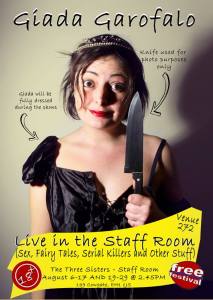
On their way to Shepherd’s Bush tonight (L-R): Luca Cupani, Giacinto Palmieri, Giada Garofalo and Romina Puma
Tonight, I am off to see the London-based Italian language comics of Il Puma Londinese preview their Edinburgh Fringe show at Kate Copstick’s Mama Biashara charity shop in London.
I talked to one of them – Giada Garofalo – about her upcoming Edinburgh solo show, catchily titled Live in The Staff Room (Sex, Fairytales, Serial Killers and Other Stuff)
“You are a Sicilian,” I started. “So you’re not to be messed around with…”
“I am not connected to the Mafia,” she told me. “I am a good girl, though I know people. But I don’t want to talk about that, because that could be really weird.”
“Oh,” I said. “OK. How long have you been in the UK?”
“I have been here for 13 years.”
“Why did you come over here?’
“I ran away. I was going through a tough time. My mama had passed away two years before. I was a bit lost. I was in a very serious relationship. I was going to get married soon.”
“So you came over here to marry an Englishman?”
“No. I came over to run away from my Italian. But it wasn’t just for that. I came for two months, just to refresh my English and, instead, I thought – Hey! – I don’t want to go back home. I don’t want to get married. I want to live a different life. I went back home for a month, left everything, came back to London and here I am.
“The first year, it was tough to find a job and I started to do an unpaid internship in PR because, after my degree, I did a Masters in Italy in Business Communication. Big mistake. It’s not me.”
“What is Business Communication?” I asked.
“Marketing, PR. So I did an internship here and, after a couple of internships, I got a job doing a little bit of PR, then moved into Admin because, at the same time, I had started to write bits because I wanted to be an academic.”
“In what?” I asked.
“I specialised in terrorism and security. I have written about human rights. I have written about European politics. I wanted to do a PhD. So, while I had my job in Admin here, I started to work with some universities as an external researcher and I was writing at night.”
“For British universities?” I asked.
“No. a couple of Italian ones. We wrote papers that were collected in academic books. Then I did another Masters here in Security Studies and I kept writing about terrorism, theories of the state and blah blah blah. Then I wanted to do a PhD but I didn’t get a full scholarship and thought: I can’t carry on working full-time and doing academic stuff at night. I was tired and I was also a little bit fed up with politics, a little bit cynical, and so, one day, I thought: I’ll do a comedy course.”
“Terrorism to comedy is a bit of a jump,” I suggested.
“Well, not really. You can be interested in different things. I just wanted to do one gig, just for my birthday. I had already said In another life I might be a comedian and my sister said Why do you have to wait for another life? So I did the comedy course. I did the gig. And I really enjoyed it and haven’t stopped since.”
“What is the appeal?” I asked.
“At the beginning, when you start, I think it’s the adrenaline on stage. Now I really enjoy the writing. My favourite moment in comedy is the first time I come out with ten minutes of new stuff and it’s not even polished. Then there is the editing and the things you learn. It’s a learning process. To learn how to be more concise and connect with the audience. It took me nine months to get rid of the microphone stand.
“I had always used to study, analyse, deconstruct. But with comedy – and with photography, which I started at the same time – I’m learning by doing. It comes from the inside. It’s very slow – it’s coming up to seven years now… That’s pretty much me in a nutshell… Maybe more nuts than shell.”
“How would you describe your act?” I asked.
“I do more storytelling than stand-up.”
“And, when you started…?”
“The first gigs I did were about language and being Italian but then I thought: I can’t do that, because all foreigners do that. Then I became aware of this idea that all women in comedy talk about the same things, so I thought: I’m not going to talk about these; I am NOT going to be ‘the female comedian’ or ‘the foreign comedian’. So all I had left was politics and I got into a niche: benefit gigs, the Marxist Festival. But I thought: I want to talk about other things. So I gave up for six months, then I started to do Il Puma Londinese, which was really interesting. It started three years ago and I joined about six months later.

After Il Puma Londinese show (L-R) Marouen Mraihi., Giada Garofalo, Giacinto Palmieri, Romina Puma, Alex Martini
“I stopped seeing myself as an Italian, stopped seeing myself as a female – just being me. Humour is more universal than we think, except for specific cultural references”
“Is your Italian-language comedy different from your English-language comedy?”
“No. Though some jokes are different. In Italian, I maybe play more with the language, but 95% of what I say in Italian is what I say in English.
“In Italy, we have this tradition where you do a comedy monologue as a character. In this country, you just do it as yourself. You don’t have to create a character. That’s great, because I can’t act, I don’t know how to create a character, so I can just be me.”
“And your Edinburgh Fringe show this year…?” I prompted.
“I get bored very easily with what I write so, this year, I have decided to go unscripted. I have five bullet points. Every time I go on stage, I will try to say it in a different way and improvise it.”
“When I saw the preview,” I said, “it seemed tight.”
“I’ve got a good memory. The problem is that, if I write down the script, I will remember it word-for-word immediately and, after that, it becomes a lecture. This year, I want to play the show to the room, not just play the show.”
“It is about fairy tales?” I asked.
“Fairy tales with a twist, because I talk about the original fairy tales, which were horror stories. We have this idea of fairy tales as Oh! Find your Prince Charming! – Well, in fact, Prince Charming used to rape the princesses.”
“In the original version,” I said, “he did not waken up Sleeping Beauty with a kiss…?”
“No. They were really gruesome. In Cinderella, one of the sisters gets her toes cut off to try to fit in the shoe. Sleeping Beauty is really gruesome.”
“And you have this interest in serial killers…” I said.
“When someone tells me: This is how you should feel about something, I tend to go the opposite way just to see if it’s true or not. And, since I was a kid, I’ve been fascinated by serial killers.
“I think there is a potential serial killer in all of us and, I guess, being a comic means you are a bit of a psychopath. Serial killers lack empathy with their victims and, to find humour, you have to be detached, you need to lack empathy. For a comic, if they have had a good night, they say they ‘killed’.”
“Or,” I said, “the comic ‘dies’ on stage… But surely the performer has to have total empathy to ride and control the audience’s emotions?”
“That’s when you’re performing,” said Giada. “I’m talking about writing. But, even on stage, you have to assert your power over an audience – in a nice way. You do want to control the audience, to manipulate them and that’s what serial killers want. But it’s just comedy. I’m just messing around. I dunno.”
“Your show title also has the word ‘sex’ in it,” I said.
“I discovered porn at a late age,” said Giada. “I think maybe I watched a couple of movies back in the age of videocassettes. But, in the last couple of years, there has been a lot of talk of… I don’t know if it’s because of social media or because there’s been a shift in people… a lot of talk about pornography and feminism and anti-feminism and, I think, in some cases, it’s a bit trivial. So I decided to watch porn.
“Some stuff was really fun; some stuff made me feel uncomfortable. Maybe porn is to other people what serial killers are to me. Where I can explore some darker fantasies without acting upon them. And one of the theories about fairy tales is that they had that same function: to provide a safe place for children to explore their fears and darker fantasies. I dunno. I don’t have an answer. I just have questions.”




















